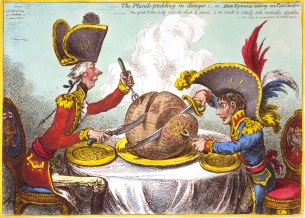‘wherever they enjoyed liberty, there they thought themselves at home’
John Toland
In pursuit of radical politics and UK republicanism I hate ceding ground to the opposition. But it seems that all too often we avoid certain issues in a misplaced idea that they are ‘bad territory’ for us. History and tradition is one such issue. The establishment controls the historical narrative to the extent that most popular history is about monarchs, empires and generals. So a huge area is left uncontested, leaving people ignorant of the great deeds of Levellers, Chartists and Suffragettes to name but a few.
It would be churlish not to recognise that things are changing. For example, we now have an English Civil War Centre at Newark (so Republicans can at last start talking about it!) and an increasing number of excellent books on radical and people’s history. But, alas, the media is largely silent and education is often woeful. Similarly with art and literature. I am happy to join with others to promote the great work of the poet Shelley, but even so the Chartist poets remain largely forgotten and there are excellent contemporary poets such as Spike the Poet from Corby struggling for recognition.. Their work is inspirational.
Another subject is patriotism. I have blogged previously about an alternative, and I consider correct, view of patriotism to the popular one which owes too much to nationalism and jingoism. But I want think about extending that concept of patriotism to involve a love of your country as a home for liberty. Patriotism in this sense strives not only for a just and free society at home, but seeks to make sure we act justly beyond our borders (what price arms sales to Saudi!), Writing about the ideas of Marcia Baron (more here) who worked on this ethical patriotism, Igor Primoratz said:
A patriot of this, distinctively ethical type, would want to see justice done, rights respected, human solidarity at work at any time and in any place….She would be proud of the country’s moral record, when it inspires pride.
But thee are other aspects to this view of patriotism. Now, obviously, you can only enjoy liberty at the place where you are currently and not where you were born, assuming they are different. This feature makes it ideally suitable for a world where so many people are moving around, both within and between nations and continents. Maurizio Viroli put it another way. Writing about the author of my opening quote, John Toland, he pointed out that in his conception:
As long as the fundamental value that inspires love of country is liberty, one can find this country elsewhere.
Am I a patriot? Yes. I believe that we in these islands can develop a genuinely free and just society, but we have a long way to go. I am a patriot because I am prepared to work towards that day and not give up. I guess that places me in the ‘ethical patriotism’ camp. But here is the thing. I believe that there are Irish people, French people and people in every nation who wish the same thing. I encourage, support and applaud them Tom Paine also believed this kind of internationalism and I think he was correct.
Lastly, if Martin Luther King can have a dream, so can I. My dream is that one day the the current international race based on resources and war is replaced by a new one. This new race will be to extend ever greater liberty to their citizens. One of the criteria for winning the race will be to assist other nations with their goals of liberty, to free citizens from domination by hunger, debt and violence. To free them from religious persecution, homophobia, sexism or any number of other prejudices That this race is endless and cannot be won but must be run.…
OK, so MLK had a better dream than me. I can handle that!
 In a previous post I wrote briefly about William Murray, 1st Earl of Mansfield, who was a central figure in establishing the illegality of slavery in Britain at the end of the 18th Century. Mansfield’s judicial comments are a reminder that when greed results in an abrogation of moral responsibility then legislation is the only solution. In no other case than slavery is it more clearly apparent that good laws, along with appropriate recourse to contest bad laws, extend our freedoms.
In a previous post I wrote briefly about William Murray, 1st Earl of Mansfield, who was a central figure in establishing the illegality of slavery in Britain at the end of the 18th Century. Mansfield’s judicial comments are a reminder that when greed results in an abrogation of moral responsibility then legislation is the only solution. In no other case than slavery is it more clearly apparent that good laws, along with appropriate recourse to contest bad laws, extend our freedoms.
 Donald Trump’s campaign slogan Make America Great Again has been enthusiastically adopted in a British context by UKIP and deployed in a modified form by Conservatives. But why should we be wary of this seemingly uplifting phrase?
Donald Trump’s campaign slogan Make America Great Again has been enthusiastically adopted in a British context by UKIP and deployed in a modified form by Conservatives. But why should we be wary of this seemingly uplifting phrase? Fake news is often presented to us as being a new development. but in fact the phenomenon has been around for a long time (so false information about fake news!). It is only the source and speed of media dissemination which has altered. So why is it a problem and why should we worry about it now?
Fake news is often presented to us as being a new development. but in fact the phenomenon has been around for a long time (so false information about fake news!). It is only the source and speed of media dissemination which has altered. So why is it a problem and why should we worry about it now?